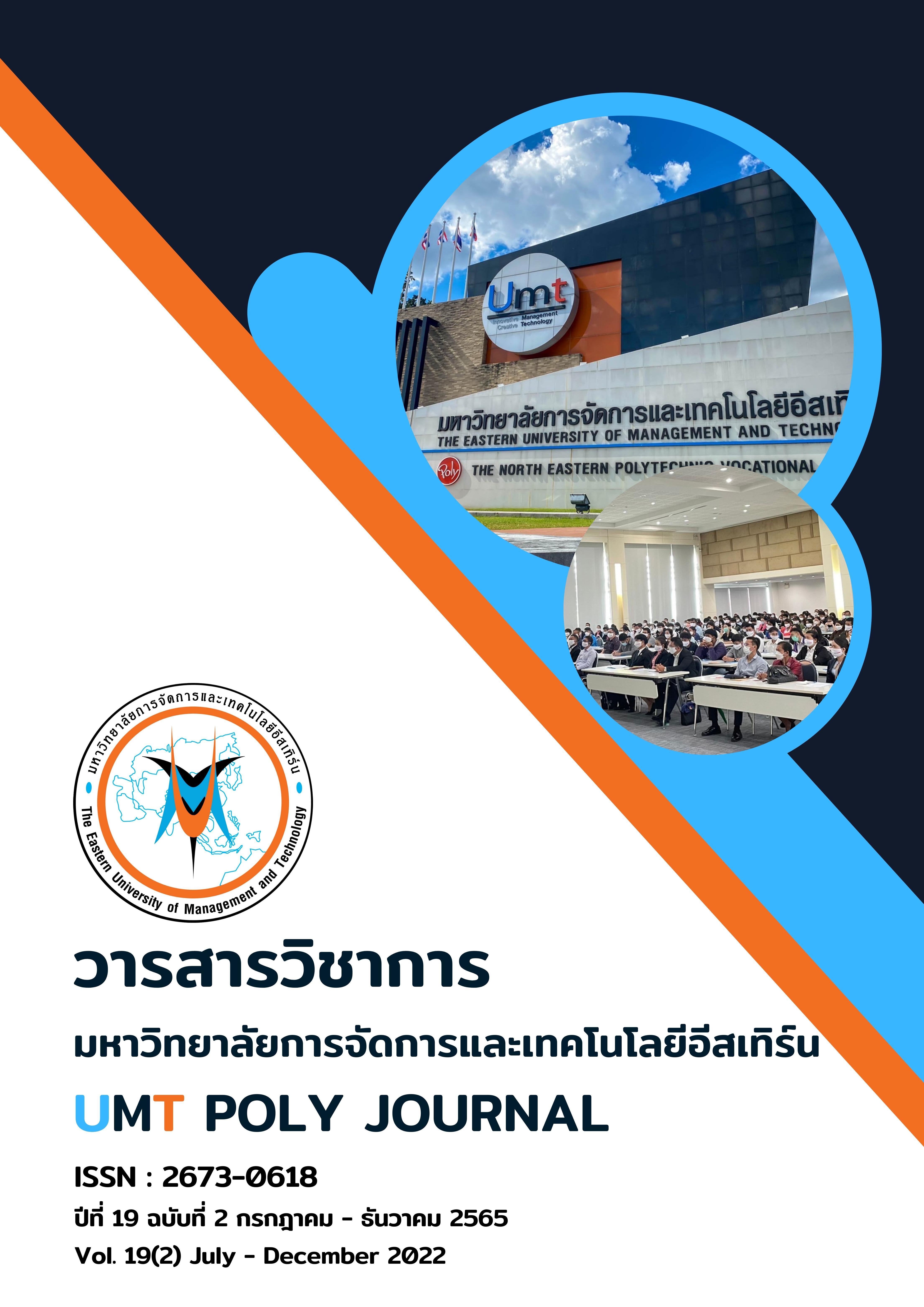อิทธิพลคุณภาพบริการของเฟซบุ๊กที่มีผลต่อความพึงพอใจและ การตั้งใจใช้อย่างยั่งยืนของลูกค้า
คำสำคัญ:
คุณภาพบริการเฟซบุ๊ก, ความพึงพอใจ, การตั้งใจใช้อย่างยั่งยืนบทคัดย่อ
บทคัดย่อ
งานวิจัยนี้มีวัตถุประสงค์วิจัยเพื่อศึกษาอิทธิพลของคุณภาพบริการเฟซบุ๊กที่มีผลต่อความพึงพอใจและการตั้งใจใช้อย่างยั่งยืนของลูกค้า โดยผู้วิจัยได้ออกแบบสอบถามจากการทบทวนวรรณกรรมแล้วนำไปรวบรวมความเห็นของกลุ่มตัวอย่างของประชาชนที่มีประสบการณ์ในการใช้เฟซบุ๊กในเขตจังหวัดศรีสะเกษ จำนวน 399 คน สถิติที่ใช้ในการวิเคราะห์ได้แก่ ร้อยละ ความถี่ ส่วนเบี่ยงเบนมาตรฐาน และวิเคราะห์ถดถอยพหุคูณ ผลวิจัยพบว่า องค์ประกอบของคุณภาพบริการของเฟซบุ๊ก เช่น คุณภาพปฏิสัมพันธ์และคุณภาพผลลัพธ์มีอิทธิพลต่อการพยากรณ์อย่างมีนัยสำคัญทางสถิติต่อความพึงพอใจของลูกค้าที่ร้อยละ 58 และมีอิทธิพลพยากรณ์อย่างมีนัยสำคัญทางสถิติต่อการตั้งใจใช้ของลูกค้าอย่างยั่งยืนเช่นกันที่ร้อยละ 62.
Downloads
เอกสารอ้างอิง
รายการอ้างอิง
กัญญ์สิริ จันทร์เจริญ. (2554). บทที่ 5 การกำหนดประชากรและกลุ่มตัวอย่าง, https://www.ict.up.ac.th/surinthips/ResearchMethodology_2554....PDF
ประสพชัย พสุนนท์. (2557). ความเชื่อมั่นของแบบสอบถามในงานวิจัยเชิงปริมาณ, วารสารปาริชาต มหาวิทยาลัยทักษิณ, 27(1), 144-163.
พงษ์ศักดิ์ ซิมมอนด์ส. (2560). การทดสอบข้อตกลงเบื้องต้นของการวิเคราะห์การถดถอยเชิงเส้นตรง, วารสารวิจัยและพัฒนาหลักสูตร, 7(2), 20-37.
วีระศักดิ์ จินารัตน์. (2564). ระเบียบวิธีวิจัยสมัยใหม่, พิมพ์ครั้งที่ 1; อุบลราชธานี, ยงสวัสดิ์ อินเตอร์กรุ๊ปจำกัด.
วีระศักดิ์ จินารัตน์. (2564). มาตรฐานงานวิจัยเชิงปริมาณและการพัฒนา, พิมพ์ครั้งที่ 1; อุบลราชธานี, ยงสวัสดิ์ อินเตอร์กรุ๊ปจำกัด.
Bano, S., Cisheng. W., Khan. A. N., & Khan. N. A. (2019). WhatsApp use and student's
psychological well-being: Role of social capital and social integration. Children and Youth Services Review, vol. 103, pp. 200-208.
Brady, MK, & Cronin. J. (2001). Some new thoughts on conceptualizing perceived
service quality. A hierarchicalapproach, 65, 34-49.
Chotipunyo, W., & Wongpinunwatana, N. (2015). Factors affecting positive attitude and purchase intention towards transgender products via facebook social network website: case study www.facebook.com/toodsdiary, JISB, 1(1), 73-85.
Chen, S.C, Yen. D.C, & Hwang. M.I. (2012). Factors influencing the continuance intention
to the usage of Web 2.0. An empirical study. Comput. Hum. Behav, 28, 933-941.
Duong, G. H, Wu. W.-Y, & Le. L. H. (2020). The effects of brand page characteristics on
customer brand engagement: Moderating roles of community involvement and comedy production contents. Journal of Brand Management, 27, 1-15.
Ebrahim. R. S. (2019). The role of trust in understanding the impact of social media
marketing on brand equity and brand loyalty. Journal ofRelationship Marketing, 19(4), 1-22.
Ellison, N.B., Steinfield. C. & Lampe. C. (2007). The Benefits of Facebook "Friends":
Social Capital and College Students' Use of Online Knowledge Sharing Among Tourists via Social Media Social Network Sites. J. Comput Med. Commun, 12, 1143-1168.
Gronroos, C.A. (1984). Service quality model and its marketing implications, 18, 36-44.
Hsu, W.S, Qing, F., Wang. C.C, & Hsieh. L.H. (2018). Evaluation of service quality in
facebook-based group-buying. Electronic Commerce Research and Application, 28, 30-36.
Hossain, M. A., & Kim. M. (2020). A comprehensive study on social commerce in social
networking sites. Sage Open, pp. 1-13.
Hossain, A. & Kim. M. (2018). Does Multidimensional Service Quality Generate
Sustainable Use Intention for Facebook. Sustainability 2018, 10, 2283; doi: 10.3390/su10072283.
Hennig, T.T, Gwinner. K.P, Walsh. G, & Gremler. D.D. (2004). Electronic word-of-mouth
via consumer-opinion platforms. What motivates consumers to articulate themselves on the Internet, 18, 38-52.
Kuo, Y.F, Wu. C.M, & Deng. W.J. (2009). The relationships among service quality,
customer satisfaction, and post-purchase intention in mobile value-added services. Comput. Hum. Behav, 25, 887-896.
Lu, Y, Zhang. L, & Wang. B. (2009). A multidimensional and hierarchical model of
mobile service quality. Electron. Commer. Res. Appl, 8, 228-240.
Lien, C. H., Cao. Y., & Zhou. X. (2017). Service quality, satisfaction, stickiness and usage
intentions: An exploratory evaluation in the context of WeChat services", Computers in Human Behaviour, vol. 68, pp. 403-410.
Raza, S.A., Qazi. W., & Umer. A. (2016). Facebook is a source of social capital building
among university students: Evidence from a developing country. Journal of Educational Computing Research, pp. 1-28.
Vivek, SD. (2009). A Scale of Consumer Engagement. Ph.D. Thesis, The University of
Alabama, Tuscaloosa AL USA.
Wang, W, Hsieh. JP, & Song. B. (2012). Understanding user satisfaction with instant
messaging: An empirical study. Int. J. Hum. Comput. Int, 28, 153-162.
Wiese, M, Martínez-Climent. C, & Botella-Carrubi. D. (2020). A frame work for
Facebook advertising effectiveness: A behavioral perspective Journal of Business Research, 109, 76-87.
Wang, K.-Y, Chih. W.-H, & Hsu. L.-C. (2020). Building Brand Community relationships on
Facebook Fan pages: The role of perceived interactiv-ity. International Journal of Electronic Commerce, 24(2), 211-231.
Zhao, L, Lu. Y, Zhang. L, & Chau. PYK. (2012). Assessing the effects of service quality
and justice on customer satisfaction and the continuance intention of mobile value-added services: An empirical test of a multidimensional model. Decis. Support Syst, 52, 645-656.
ดาวน์โหลด
เผยแพร่แล้ว
ฉบับ
ประเภทบทความ
สัญญาอนุญาต
ประกาศลิขสิทธิ์
เนื้อหาและข้อมูลในบทความที่ลงตีพิมพ์ในวารสารวิชาการมหาวิทยาลัยการจัดการและเทคโนโลยีอีสเทิร์น ถือเป็นข้อคิดเห็นและความรับผิดชอบของผู้เขียนบทความโดยตรง ซึ่งกองบรรณาธิการวารสารไม่จำเป็นต้องเห็นด้วยหรือร่วมรับผิดชอบใด ๆ
บทความ ข้อมูล เนื้อหาหรือรูปภาพ ฯลฯ ที่ได้รับการตีพิมพ์ในวารสารวิชาการมหาวิทยาลัยการจัดการและเทคโนโลยีอีสเทิร์น ถือเป็นลิขสิทธิ์ของวารสารวิชาการมหาวิทยาลัยการจัดการและเทคโนโลยีอีสเทิร์น หากบุคคลหรือหน่วยงานใดต้องการนำข้อมูลทั้งหมดหรือบางส่วนไปเผยแพร่ต่อหรือเพื่อกระทำการใด ๆ จะต้องได้รับอนุญาตเป็นลายลักษณ์อักษรจากวารสารวิชาการมหาวิทยาลัยการจัดการและเทคโนโลยีอีสเทิร์นก่อนเท่านั้น




